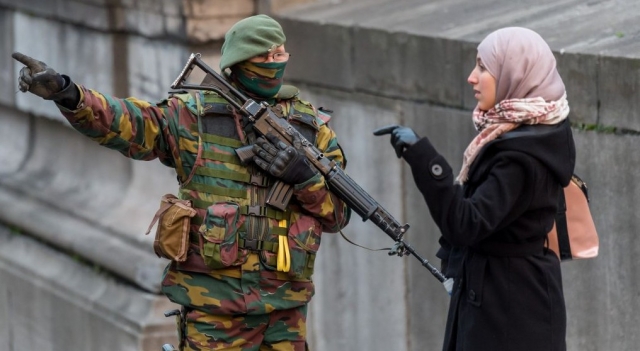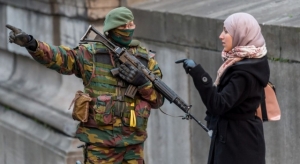Op-Ed: Brussels’ Importance to the West and its Allies
Tuesday’s terrorist attacks in Brussels, which left more than 30 dead and dozens in critical condition after brothers Khalid and Ibrahim el-Bakraoui detonated themselves in the administrative heart of the European Union, is yet another sign that the West’s fractured approach to combating radical terrorist groups like ISIS is simply not working.
For the third time in just over 16 months, a major European city – not including attacks in Istanbul – has been successfully targeted by followers of the Islamic State, leaving scores dead and most of the continent’s leaders still searching for a coherent strategy to counter future attacks.
Lost in the tragedy of Charlie Hebdo, Paris and now Brussels is a powerful message to Western leaders – including US President Barack Obama – that the fight against ISIS has thus far failed to achieve its main goal of ultimately crushing the group’s appeal and destroying its ability to indiscriminately kill both Muslims and non-Muslims alike.
Obama’s plodding and exceedingly muddled strategy to defeat the Islamic State in Syria and Iraq has done little to dent ISIS’ charismatic appeal, disrupt its propaganda or even prevent it from killing Europeans on their own soil.
One of the targets of the Brussels attacks was a metro station directly adjacent to the European Union parliament — a target ripe with symbolism for a group bent on destroying the basic foundations of the European project.
That ISIS quickly claimed responsibility for twin attacks carried out by members of a large Belgian cell that had been trained in Syria and who lived in an otherwise quiet European country, was a signal to the West’s governments that nothing has changed since 130 people were killed in Paris in November 2015.
Tuesday’s bombings were possibly a retaliatory action by ISIS affiliated groups as they came just four days after Belgian police arrested the sole survivor of the Paris attacks, Salah Abdeslam.
According to Brussels’ chief prosecutor, the country’s security services now believe a major terrorist operation may have been in the works as police impounded a huge weapons and explosives cache after raiding the house of a cell commanded by Abdeslam.
The nature and scope of Abdeslam’s official relationship with ISIS remains unclear. His actions in Paris – where he abandoned his fellow terrorists in their suicide mission – ran counter to the group’s praise of martyrdom and was a direct violation of the ideological importance that ISIS places on the act.
This could indicate that he and his associates are, at best, affiliates or followers of the Islamic State, rather than official ISIS agents.
Lack of Cohesion
Western law enforcement agencies, security services and governments – many of which belong to some of the most advanced and richest nations on Earth – have all failed to properly coordinate a strategy that would ultimately put an end to ISIS’ disciples in Europe and North America.
This is more than troubling; it has proven deadly.
Unlike its far larger neighbors, Germany and France, Belgium is a relatively weak country institutionally. It suffers from poor intelligence and security coordination, while at the same time is one of Europe’s main contributors of would-be jihadis travelling to Syria.
Limited resources and even poorer coordination with some of the world’s best intelligence services in Paris, Berlin and London have left the country adrift in its effort to halt the flow of radicalized Muslim youths in Brussels’ impoverished Molenbeek neighborhood from leaving for Syria to join ISIS.
The Islamic State’s powerful public relations and propaganda tools continue to find a huge following amongst a growing number of young Europeans who are attracted to the violent, irreverent life of an international jihadist with easy access to an endless supply of money, power, sophisticated weaponry and the seductive appeal of having a place of purpose among like-minded individuals.
Very few of these young people have more than a passing knowledge of the teachings of Islam, though the vast majority do come from Muslim families. Rather, they’re more often attracted to what they see as an empowering status symbol in a wider, international movement.
This stands to explain why so few take umbrage at ISIS’ brutal treatment of women and minorities as well as its teaching of Takfirism, which equally brands Muslims and non-Muslims as apostates.
Dubbed jihadi-chic by the Western media, this deadly new youth subculture in the Islamic world is a formidable foe. And while its various branches have scored stunning successes with increasingly brutal attacks from California to Ankara, it can be defeated.
A Call to Recalibrate
Obama has repeatedly insisted that a military coalition of Western, Turkish, Arab and Kurdish allies can defeat ISIS. Since coordinated combat operations were launched in August 2014, following ISIS’ stunning victories in northern Iraq, more than 20 per cent of the group’s territory has been recaptured.
Few Western officials, however, advocate a deeper military commitment that would include the deployment of large numbers of ground forces. This indecisive policy has essentially frozen the efforts of the international coalition to destroy ISIS militarily and paralyzed its efforts to formulate a coherent policy to combat the group’s poisonous hi-tech propaganda campaign.
Inaction at both ends has opened the door for third parties, namely Vladimir Putin’s Russia, to enter into the fray and further complicate matters by stifling the West’s strategy towards the Islamic State and the wider security crisis in the Middle East.
Putin’s recently concluded six-month air campaign in Syria did nothing to combat ISIS, but succeeded in propping up his erstwhile ally Bashar al-Assad, killed thousands of civilians and neutralized most of the forces on the ground capable of defeating the Islamic State in combat.
Russia’s unscrupulous Kremlin-controlled media has gone to great lengths to castigate the West’s approach to Syria and helped Putin successfully defend his support for the autocratic Assad regime and the five-year civil war that it has waged on its own people.
The ensuing migrant crisis that has engulfed Europe for the last 18 months has nothing but benefitted Putin in his attempt to fracture Europe’s cohesion, and with it, the NATO alliance itself.
The ‘weaponization’ of the refugee crisis by Putin’s formidable propaganda machine both within Russia and the Middle East has strained Europe to the breaking point and distracted the US and UK in their efforts to combat the growing appeal of groups like ISIS.
Putin’s manipulation of the refugee situation and the facts on the ground has forced the West to deal with hot-button issues including resettlement, rising crime and a firebrand form of nationalism that has swept through Europe, the UK and US over the last year.
This has deeply shaped public opinion and forced electorates from Marseilles to Boston into dealing with the rise of xenophobic populist demagogues like France’s Marie Le Pen and the US’ Donald Trump, rather than form a cohesive alliance against enemies that the Western world has stood against since the Cold War.
NATO’s Role
Shortly after the Paris attacks in November, there was widespread speculation that France might invoke article 5 of the North Atlantic Treaty Organization’s charter, whereby an attack on one NATO member will be treated as an assault on the alliance as a whole.
French President Francois Hollande opted not to do so, but he did publicly declare that France was from that moment on at war.
Much like his counterpart in Washington, Hollande has yet to define whom the war is being fought against. And similar to Obama, he’s been unwilling to fully commit France’s vast military and intelligence resources to the conflict’s front line, wherever and with whomever that may be.
While a limited amount of coordination has taken place with regard to the relative low number of air strikes carried out by NATO members, save for Turkey, a unified approach within the alliance has yet to be created that would combat the robust and far more affective information war that both ISIS and Russia have declared on the West.
NATO has long sought to expand its influence in the two decades since the collapse of the Soviet Union, and when the alliance expanded into countries that once comprised the Eastern Bloc, it consciously took on the responsibility of defending the Western aspirations of its new members.
At present, the alliance still has the option of expanding its unmatched military capabilities by opening a social and information front aimed at thwarting the influence that both ISIS and Putin currently enjoy.
While both Moscow and ISIS militants gain from the success of the other, officials in NATO have to assume that a major defeat will also carry over.
The Need to Unify Against a Common Foe
Western leaders must remember that the NATO alliance is a powerful, multinational tool that neither Putin nor ISIS leader Abu Bakr al-Baghdadi has at his disposal.
Furthermore, aspirant countries Georgia, Bosnia and Ukraine, all of whom embody the ideal of the European project, must be incorporated into a newly emboldened NATO.
Western governments must remind themselves that the alliance was created by likeminded nations as the champion and chief defender of the West’s core values. These are the same ideals that are such an existential threat to Putin’s autocratic regime or the maniacal barbarism of ISIS.
When high profile political figures like Trump or the UK’s radical leftist Labour Leader Jeremy Corbyn call for an end to the NATO alliance or a withdrawal of its key members over budgetary concerns, this only plays into the hands of the alliance’s main adversaries.
European governments do have a precedent they can follow when combating such threats. They successfully assisted one another to end the merciless 1970s terrorist campaigns carried by Marxist groups that included Germany’s Baader-Meinhoff and Italy’s Brigata Rosse.
A similar effort, under NATO’s direction, must be undertaken to counter any threat emanating from the faceless bureaucratic halls in Moscow or the deserts of northern Syria.
The EU and US remain the world’s two great bastions of democratic capitalism. But more has to be done to ensure that acts of terrorism and the illegal seizure of sovereign territory are never an option for those who promote force and totalitarianism as an alternative to an open society.
History will not look back kindly on those who fail to halt that ominous growing tide.
Edited by Nicholas Waller












